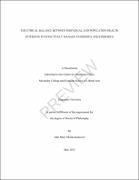| dc.description.abstract | There is no overlapping criterion providing a basis for attaining balance between individual and population oriented ethical concerns generated in the pandemic and the epidemic interventions. The shortfall leads to competing individual and population interests that hamper the effective management of pandemics and epidemics. The libertarian model focuses on advancing individual rights. The epidemiological model focuses upon population health. The social justice model focuses on a broader perspective than individual rights and population health to include universal human rights.
This dissertation suggests a Mixed Interests Ethics Model (MIEM) to ethically negotiate a balance between the individual and population interests in pandemics and epidemics. MIEM involves a combination of models (libertarian, epidemiological, andsocial justice) that shed light on substantive ethical principles of each model (e.g. autonomy, solidarity, and common good); which in turn require procedural standards (i.e. necessity, reasonableness, proportionality, and harm avoidance) to negotiate between the principles when they conflict. The UNESCO Universal Declaration on Bioethics and Human Rights provides a hermeneutical context for applying MIEM in so far as it places MIEM within the context of promoting rights (individual and human) by considering the general ethical tension between individual and universal rights as explained by the UNESCO Declaration. | en_US |


